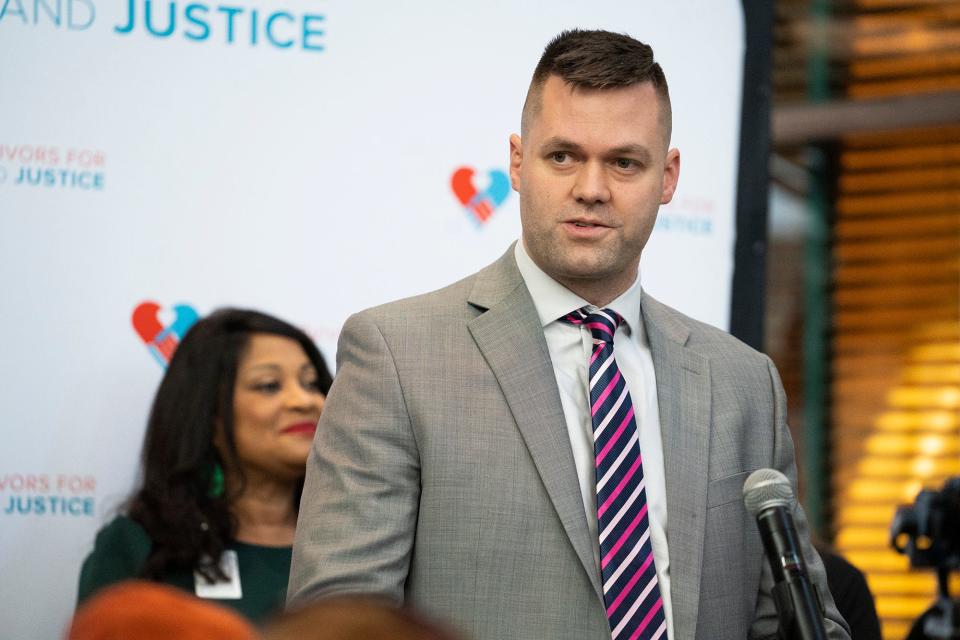More Ohioans could be committed to a hospital against their will under proposed law
Ohio lawmakers may expand the criteria for committing people to a hospital against their will.
House Bill 249 would allow officers to hospitalize people if they refuse treatment or fail to take their medication, for example, have been diagnosed with one of five mental health conditions and are expected to "suffer mental deterioration" if not treated.

The conditions outlined in the bill are schizophrenia, schizoaffective disorder, bipolar disorder, delusional disorder and major depressive disorder.
Supporters say the change is necessary so police officers can intervene before someone is in crisis. Opponents are concerned that increased hospitalizations would mean a loss of liberty for people with disabilities and could do more harm than good.
When is a person hospitalized against their will?
Currently, someone can be involuntarily committed if they would be a "substantial risk of physical harm to themselves or others" and meet one of five criteria:
Threats or attempts of suicide or serious self-harm.
Recent homicidal or violent behavior or threats.
Immediate risk of a person injuring themselves because they can't provide for their basic physical needs and there are no immediately available community resources to help.
The person would benefit from treatment and there is evidence of behavior that seriously and immediately puts themselves or others at risk.
The person would benefit from treatment and is unlikely to survive safely in the community unsupervised and has a history of not complying with treatment. The lack of compliance must have recently resulted in a hospitalization or violent behavior.
Police say they'd like to intervene before someone is in crisis
Ralph Stover Jr., a patrol sergeant with the Tallmadge Police Department near Akron, said the expansion is necessary for officers who realize someone is not doing well but they are not yet endangering themselves or others to the point that they can be hospitalized involuntarily.
Stover said at a hearing on the bill on May 7 that officers often know the people in their communities and their history well enough to know when they experience mental deterioration.
"We should not have to walk away and wait for the situation to become dangerous before we can step in and get them help. It is not fair to the person, their family, or to first responders," he said.
Rep. Bill Roemer, R-Richfield, asked about the safeguards in place so people can’t just be arbitrarily hospitalized.
Stover said officers are trained to ask questions and reach out to family members which can help them decide what form of help would best serve the person they're talking to.
"The last thing any of us want to do is use force because then it inflicts trauma on that person that next time we deal with them, they're going to remember that," he said.
Advocates say forced hospitalization can make things worse
Kerstin Sjoberg, executive director of Disability Rights Ohio, said the phrase psychiatric deterioration is too broad and it may not be line with the constitutional standard.
Sjoberg said involuntary commitment “can have really devastating and life-altering consequences,” as it can mean a loss of control over your body and what happens to you and end up breaking the trust people have in medical professionals and treatment.
She said she would like to see a focus on community resources and a holistic approach to treating mental illness, as well as alternative forms of crisis response, such as having social workers accompany police officers on mental health calls to talk to the person about what's going on and help them feel safer in their environment.
"That's what people with lived experience say that they want. They don't want to be locked up. They don't want to have unnecessary interactions with law enforcement that can be dangerous," she said. "People deserve the right to decide with their doctor or their treatment professional what makes sense."
Does Ohio have enough hospitals for increased commitments?
Rep. Sara Carruthers, R-Hamilton, mentioned at the hearing that Ohio psychiatric hospitals don’t have enough beds.
“Where will these people go?” she asked.
It's a concern Sjoberg shares. She noted that psychiatric hospitals serve a purpose but are restrictive settings and institutionalization can create the risk of abuse, neglect or sexual violence when people don't have much control over what's happening to them.
"We really need to be cautious about the places that are providing that care to make sure the care is high quality. So I think the idea that they might become over capacity or understaffed because of the increasing number of people that are being forced into hospitalization is certainly one thing to think about," she said,
Stover said by intervening earlier, treatment and evaluation will be simpler and take less time than if someone is in crisis and needs more time in a bed to stabilize.
Erin Glynn is a reporter for the USA TODAY Network Ohio Bureau, which serves the Columbus Dispatch, Cincinnati Enquirer, Akron Beacon Journal and 18 other affiliated news organizations across Ohio.
This article originally appeared on The Columbus Dispatch: Ohio lawmakers consider expanding critieria for forced hospitalization

